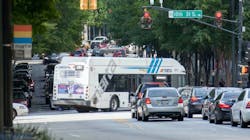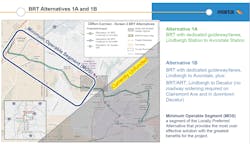MARTA moves forward with BRT for Clifton Corridor Transit Initiative Project
The Metropolitan Atlanta Rapid Transit Authority (MARTA) high capacity Clifton Corridor Transit Initiative will move forward as a bus rapid transit (BRT) project. The final two alternatives under consideration, 1A and 1B, feature BRT from Lindbergh to Avondale rail stations. Alternative 1B includes arterial rapid transit (ART) to Decatur rail station.
The project would connect existing heavy-rail lines and provide high-capacity transit along a rapidly developing residential, institutional and mixed-use corridor. Key destinations include Emory University, Emory University Hospital, the Centers for Disease Control and Prevention (CDC), Children’s Healthcare of Atlanta – Egleston and Atlanta VA Medical Center. Both alternatives include bus shuttles to the VA Medical Center.
“BRT makes sense for this corridor, providing fast, efficient transit in dedicated bus lanes,” said MARTA Assistant General Manager of Planning Shelley Peart. “More and more transit expansion projects across the country are considering BRT due to its ability to provide rail-like service more quickly, with less impact and at a lower capital cost. Those features improve the project’s overall rating and therefore its competitiveness for federal funding, which we’ve known since this project’s inception would be critical to its completion.”
Because of these advantages, MARTA has recommended BRT for other projects including along Campbellton Road in Atlanta, on State Route 54 in Clayton County and the first BRT project in the region, Summerhill.
A Locally Preferred Alternative (LPA) for the Clifton Corridor project was previously adopted by the MARTA Board of Directors, but due to changing conditions in the corridor and new funding and technology opportunities, MARTA engaged in further alternatives analysis and public outreach with the goal of identifying an LPA that maximizes community and stakeholder support, minimizes environmental and community impacts, increases the potential for federal funding and supports community needs.
“Through this process, we’ve whittled the alternatives from 10 to three and now down to two. Our team is taking the BRT alternatives to the public this week and will recommend an alternative to the MARTA Board this spring. Then, we can get to work on submitting this project to the Federal Transit Administration,” Peart said.

